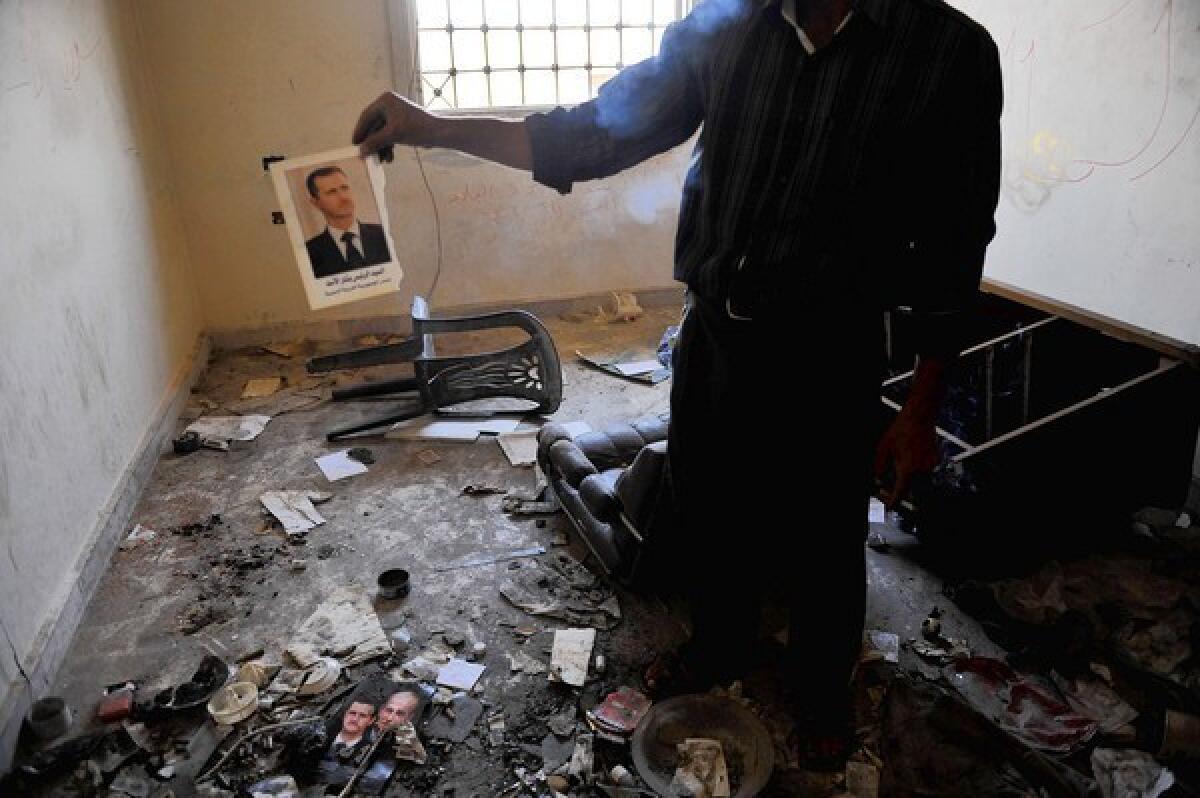Syria rebels seize key border crossings

BEIRUT — As fighting continuing for a fifth day in the Syrian capital, rebels on Thursday stormed major crossings along the Turkish and Iraqi borders that could serve as strategic links for supplies and personnel in the battle to oust President Bashar Assad.
Opposition activists said rebels took control of the Turkish border crossing of Bab Hawa, along the main road to Aleppo, Syria’s second-largest city. Rebels also reportedly seized several border posts along the Iraqi frontier, including the Abu Kamal gate near the Iraqi town of Qaim, a major transit point into Syria.
Amateur video distributed by opposition activists showed rebel fighters firing their guns into the air and shouting, “God is great!” near a crossing station, purported to be the once-bustling Bab Hawa gate. Rebels defaced a photograph of Assad positioned above a sign that said, “Welcome to Syria.”
An officer of the Syrian rebel forces said insurgents held Bab Hawa briefly and then withdrew because they knew they couldn’t withstand the superior firepower of Assad’s troops.
“Our goal was to videotape that we controlled it, and then withdraw,” Lt. Col. Khaled Hamoud said in a Skype conversation, adding that the attack would make government forces in the area more cautious.
Iraqi Brig. Gen. Qassim Dulaimi told the Associated Press that 21 Syrian border guards were killed in a rebel attack at a remote post near the Sinjar mountain range.
Although rebels have been smuggling weapons across the porous Turkish and Iraqi borders, which stretch for hundreds of miles, seizing and holding major crossing points would allow them to ferry in more arms, vehicles and supplies without having to traverse difficult terrain.
In the Syrian capital, Damascus, state media and opposition activists reported a fifth day of heavy fighting in battleground districts. There were reports of civilians fleeing neighborhoods where government troops were attacking rebels.
Though accounts of the fighting were sketchy, it seemed to be largely contained to neighborhoods and suburbs where anti-Assad sentiment was strong.
State television aired dramatic video of soldiers firing at insurgents while ducking behind buildings for cover. The decision to use such graphic images appeared to be part of a concerted government effort to galvanize an increasingly edgy population in the capital.
“This is a decisive battle, not only for Damascus but for Syria as a whole,” Syrian Information Minister Omran Zoabi told state-run TV. “They are wrong to underestimate us.”
Assad appeared on state television late Thursday, more than 24 hours after a bombing at a security headquarters killed a trio of generals, including his brother-in-law, Asef Shawkat, and the defense minister. Two other high-ranking security officials, the interior minister and the national security chief, were wounded, state-run media said.
Assad was seen swearing in a new defense minister, though it was unclear where the video was filmed. Assad’s initial absence in the aftermath of the attack had fueled speculation that he may have fled to the coastal province of Latakia, a stronghold of his Alawite sect.
Sandels is a special correspondent. A Times staff writer in Los Angeles contributed to this report.
More to Read
Sign up for Essential California
The most important California stories and recommendations in your inbox every morning.
You may occasionally receive promotional content from the Los Angeles Times.










